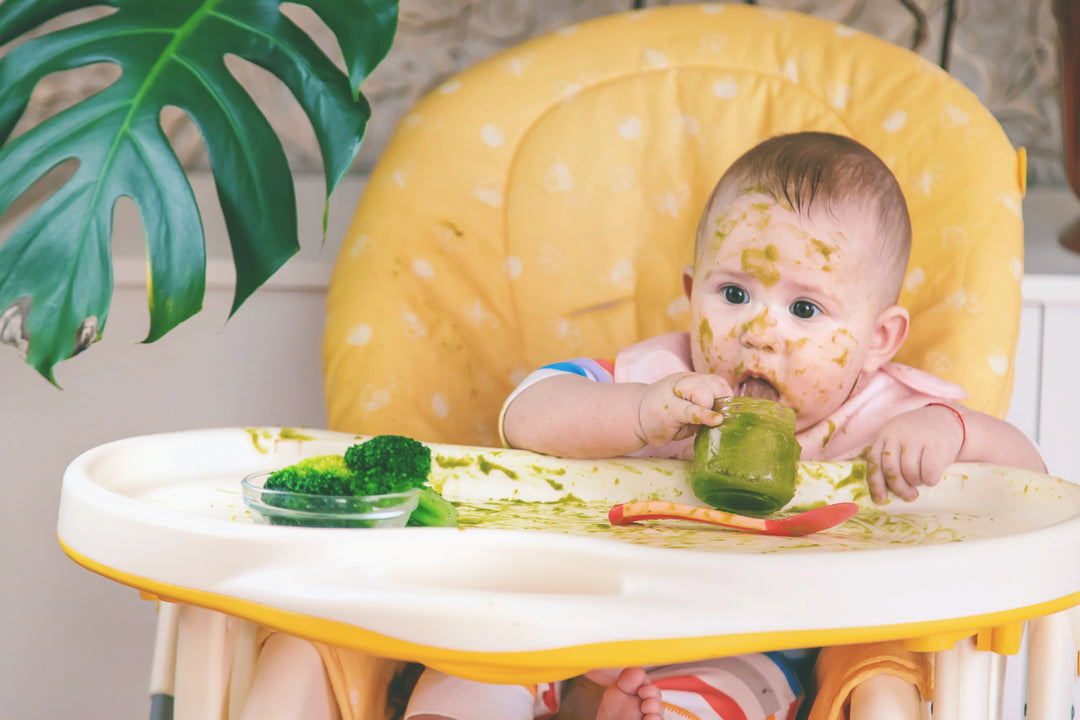What to Do if Your Baby Refuses Food When Starting Solids
As a pediatrician and parent who has tried (and sometimes failed) to get my little one to eat the foods I have lovingly prepared, I know how distressing it can be when your baby rejects their first foods. We all envision the milestone moment: a messy, joyful baby exploring a rainbow of purees and a camera at the ready. But sometimes that magical moment just doesn’t happen, and your baby looks at you confused and with a face that says, “You expect me to eat this?” as if you had offered them some soggy cardboard.
Sound familiar?
If your baby has rejected their first foods, you are not alone. Food refusal is incredibly common in the early stages of feeding, and in most cases, it is a completely normal part of development.
Let’s explore why food refusal happens, what is considered normal, and how we can support our babies with confidence and compassion.
Is this normal? Understanding why baby is refusing food when starting solids

Feeding challenges are surprisingly common (and often temporary)
According to the American Academy of Pediatrics (AAP), feeding difficulties affect up to 25% of infants and 50% of toddlers at some point. That means one in four babies goes through a phase of food refusal, and only a small percentage (1–5%) are due to underlying medical issues.
For most, this is a temporary blip in an otherwise healthy feeding journey.
Infantile anorexia: What it really means
The AAP classifies many early feeding issues under "infantile anorexia"—a term that sounds scarier than it is but is typically benign. This term simply describes a lack of interest in eating that usually begins between 6 and 12 months of age.
For many babies, feeding is more about exploration than consumption. They are busy learning to sit, chew, grasp, and play, and learning how to eat is another item on this to-do list.
Solid Foods are for learning, not just eating
From a nutritional perspective, it is also helpful to remember that breast milk or formula remains the primary source of calories and nutrients through the first year.
Starting solids is less about “how much” your baby eats and more about learning how to eat.
Common reasons why babies refuse their first solid foods
Understanding why your baby may be refusing food can help you approach mealtimes with more patience and less worry. Here are some common causes:
1. Maybe they’re just not quite ready yet
Even at six months, some babies need a little more time to develop the necessary skills for solids. Signs your baby may be ready to start solids include:
-
Sitting upright with minimal support
-
Good head and neck control
-
Showing interest in your food
-
Bringing their hands or toys to their mouth
💡 If your baby isn’t showing these cues yet, that's okay. Wait a week or two and try again.
2. Textures can be tricky at first
New textures can be overwhelming. Slippery, lumpy, or gritty foods may trigger gagging or grimacing. That doesn’t mean your baby hates the food, it just takes some time to adapt.
Research shows it can take 10–15 exposures before a baby accepts a new food. And when it comes to texture, that’s a big part of the journey. We go deeper into why texture matters here.
3. Pressure at the table? Babies feel it too
This is a big one. Babies are surprisingly sensitive to stress at the table. If mealtimes become a battle full of coaxing, pleading, or bribing, then your baby may begin to associate food with stress.
📝 A note on Ellen Satter’s division of responsibility
Here is where the "division of responsibility" comes in, a model championed by feeding expert Ellen Satter.
Your job as the parent is to decide when, where, and what your baby eats. Your baby’s job is to decide whether and how much to eat.
Respecting this division builds trust and decreases power struggles.
4. Feeling crummy? Eating isn’t fun when you’re uncomfortable
Discomfort can cause your baby to lose interest in solids. Common culprits include:
-
Teething
-
Nasal congestion
-
Reflux
Addressing the underlying discomfort and discussing with your pediatrician can help restore some interest in eating.
5. Overstimulated, overtired, or over it
Just like adults, babies are not good at multitasking when they are hungry, tired or overstimulated. If mealtime is rushed, noisy or too close to nap time, they might not engage well with the food.
Create a calm, focused environment and eat with your baby to model mealtime behavior.
Also, ditch the screens. While adults are prone to mindless eating with a show on, babies need to learn to tune into their body’s cues for hunger and fullness without distraction.
6. Not hungry right now (and that’s okay)
If your baby has just had a full bottle or a breastfeed, they may not be hungry enough to try solids.
Aim to offer food about 60–90 minutes after milk feeds so they come to the table ready to explore.
 When food refusal may signal a bigger concern
When food refusal may signal a bigger concern
Red flags that warrant a pediatric evaluation
Sometimes persistent food refusal or gagging can indicate a more complex feeding disorder, early sensory challenge, or underlying medical issue.
The AAP suggests looking for red flags like:
-
Poor weight gain or weight loss
-
Feeding times that regularly last longer than 30 minutes
-
Frequent coughing, choking, gagging or vomiting with feeds
-
Arching or screaming during feeds
-
Total disinterest in food over several weeks
These signs should prompt a conversation with your pediatrician. An evaluation with a feeding therapist or dietitian can make a big difference.
 Gentle ways to support your baby when they refuse solids
Gentle ways to support your baby when they refuse solids
1. Follow their lead (even if that means taking a pause)
If they turn away or close their mouth, respect that. It is not rejection but rather good communication. You can always try again later.
2. Eat together and make it a shared moment
Babies are natural mimics. Sit down and eat with them. Make eye contact. Chew enthusiastically. Your baby learns by watching you enjoy your food.
Make it a shared experience, not a solo event.
3. Play with texture, temperature, and presentation
Try different temperatures, textures, or shapes.
Some babies love spoons. Others prefer to feed themselves.
If purees are a flop, maybe a wedge of soft roasted sweet potato will be more enticing.
Just make sure foods are soft enough to be easily mashed by baby gums and shaped appropriately to avoid choking risks. Let them get messy.
4. No pressure, no bribes, just curiosity
Put a few bites on their tray and let them explore. Even if they just squish the food or lick the spoon, that's progress!
Narrate what you’re offering: “This is mango. It's yellow and sweet.” Let curiosity be the driver.
5. Keep the mood light and the expectations low
Remember: food before one is (mostly) just for fun.
Breastmilk or formula still provides the bulk of your baby’s nutrition until around 12 months. Solid foods are about learning new skills, flavors, and textures. That learning takes time.
Building a positive relationship with food from the start
These first few interactions with solid food can set the tone for a child’s relationship with food. Here are a few things to keep in mind:
- Don’t force-feed. It often backfires and creates negative associations.
- Don’t compare your baby to others. Each child has their own timeline.
- Stay neutral. No need to throw a party every time they swallow a bite. (Would you want a cheer squad every time you ate broccoli?)
- Avoid using distractions like toys or videos at the table
- Skip the bribes
- Focus on exposure, not volume
- Respect fullness cues. Stopping when they’re done builds body awareness
“The goal is not to raise a baby who eats kale today. The goal is to raise a child who has a healthy, trusting relationship with food for life.”
 One last thing: starting solids is a journey, not a test
One last thing: starting solids is a journey, not a test
Food refusal can be frustrating, especially when you’re doing everything “right.” But in most cases, it’s part of the process. Your baby is learning, not rejecting you or your cooking.
So take a breath. Offer the food. Let it be. If your baby skips a meal or three, they’re still thriving. And if something doesn’t feel right, trust your gut and reach out to your pediatrician.
If you're feeling overwhelmed, you're not doing it wrong.
We know this stage can feel like a lot. There’s so much advice, so many “shoulds,” and it’s easy to feel like every bite, or refusal, means something bigger. But here’s the truth: you don’t need to get it perfect!
Your baby isn’t grading your meals. And it’s not personal. Sometimes, stepping back and taking a big deep breath will do the trick. Other times it won’t, and you might lose your cool. And that’s okay.
If today felt messy or discouraging, you’re not alone. Tomorrow is a fresh chance. And you're doing a beautiful job, bite by bite!

Written by Dr. Michelle Shiffman, MD
Pediatrician & Advisor at Bébé Foodie
Dr. Michelle Shiffman is a board-certified pediatrician based in Denver, Colorado. She brings her expertise in early development, food introduction, and culturally-sensitive care to Bébé Foodie, where she supports the creation of our evidence-based content and contributes to our expert panel. Michelle’s favorite part of her work is connecting with families during infant and toddler visits—especially when it comes to discussing developmental milestones and feeding. As a mom herself, she's also experienced the ups and downs of starting solids and managing picky eating.
This blog post is for information purposes only and shouldn’t be used as personal, health, nutritional, or medical advice. Always consult with your pediatrician before making any decisions about your child's health or readiness for various foods.




Leave a comment